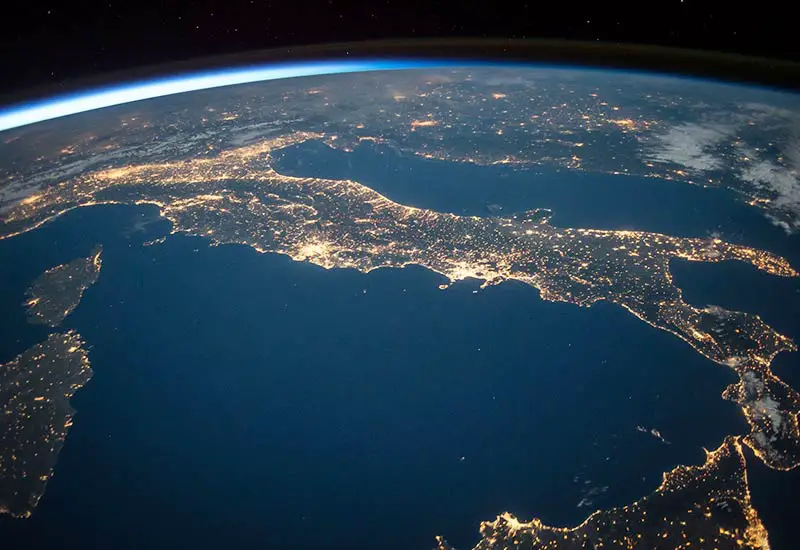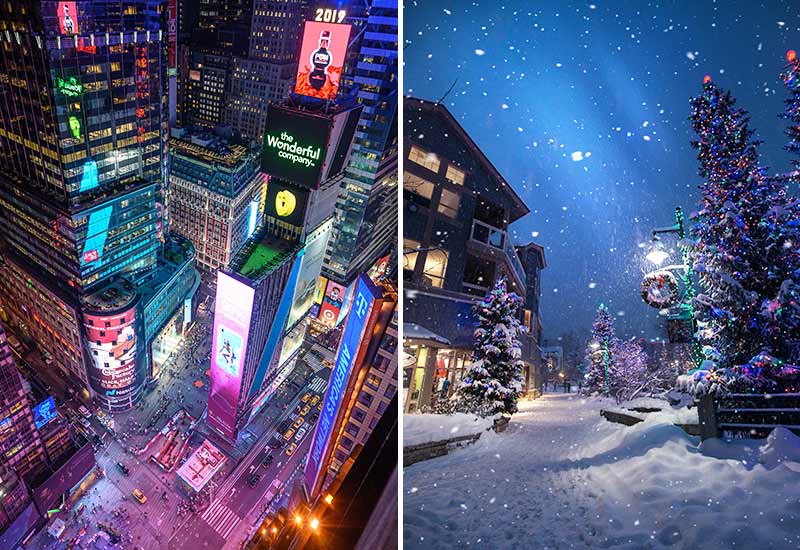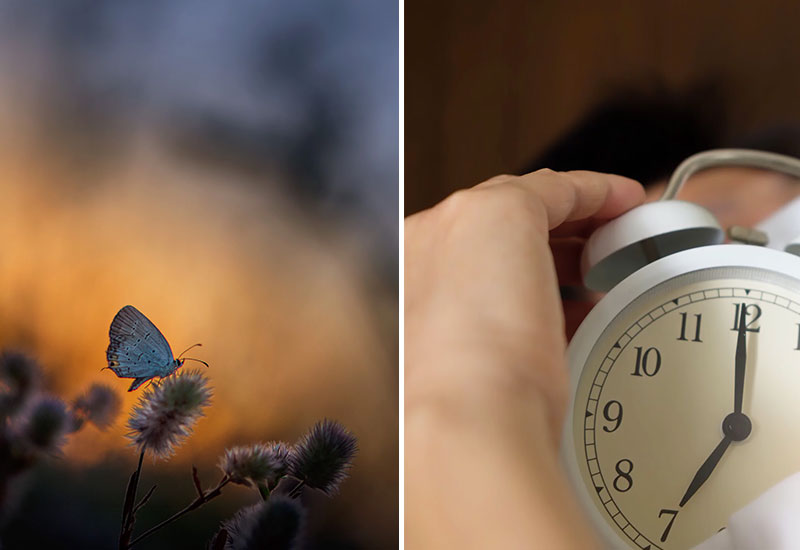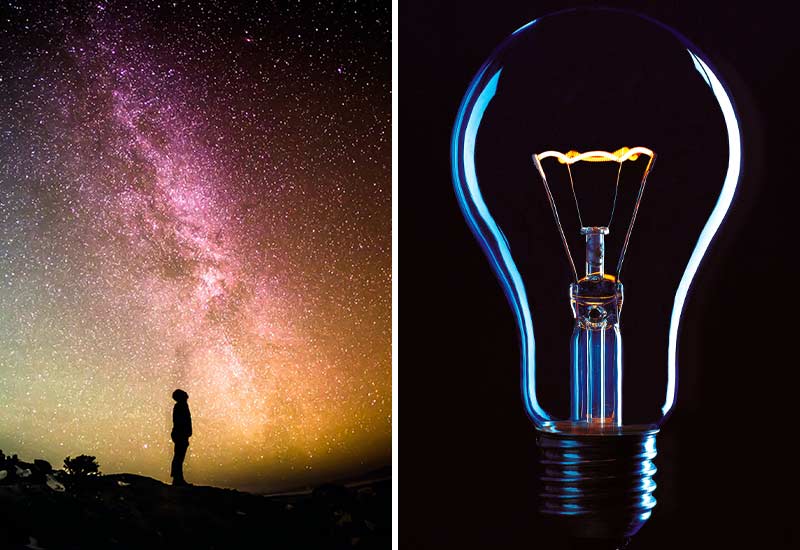What is actually understood by light pollution? If you are asking yourself this question right now, you are absolutely right here! Whether through street lamps, in the home or on neon signs - for most people, the existence of artificial light sources is now a matter of course. Electric light ensures that we can see something even in the dark. We also feel safer when we are out and about at night.
However, the earth is getting brighter and brighter, so that there are fewer and fewer places that are completely dark. Unfortunately, only very few people think about the fact that the annually increasing light emissions have serious consequences for ourselves and for our environment.
In this article, I would like to explain everything you need to know about light pollution. From the definition, causes and consequences, to the solutions. Let's go!
Definition: What is light pollution?

The term light pollution (also called light smog or light contamination) refers to the Brightening of the night sky by artificial light sourceswhich results in the absence of complete darkness in the affected regions.
The light from electric lighting is scattered into the atmosphere, which has a negative impact on the environment. This is another reason why light emissions are considered Environmental pollution from artificial light.
And what is natural light? This is, for example, the light of the sun and the stars - that is, all the light that is not artificially produced by us humans.
Statistics: What facts and figures exist on light emissions and light smog?
So we humans generate a kind of "light garbage". But how bad is the problem really? To get a better understanding of this, I would first like to give you some scientific facts and figures about light pollution:
- Worldwide increase: The intensity of artificial lighting and the extent of the illuminated area have increased worldwide by around 2 percent per year since 2012.1
- Increase in Germany: According to estimates, light pollution in Germany is increasing by around six percent every year.2
- Intensity: Due to light emissions, some of our cities are 4,000 times brighter than natural night light.3
- Insect mortality: In one night, an average of 150 insects die from a single street lamp.₃ According to the Federal Ministry for Economic Affairs and Climate Protection, there are around ten million street lamps on roads, paths and squares in Germany.4
- Dissemination: More than 80 percent of the world's population and more than 99 percent of the US and European population live under light-polluted skies.5
Causes: How does light pollution occur?

Through human influence the earth is not only getting warmer (keyword: Climate Change), but also even brighter. But how exactly do we cause light emissions? The answer to this question could be an endless list of light sources - I would like to spare you that. Instead, I'll present the most important causes for the increasing light smog.
Technical progress
The electric Lighting becomes more and more effectiveso that considerably more light can be generated with the same power consumption. The lower power consumption leads to the installation of even more or and even brighter lighting. (Rebound Effect)
Poor light distribution
For the most part Light sources not shielded well enoughso that they not only illuminate the object or environment to be lit, but also shine in all directions in an uncoordinated manner. Even where no light is needed at all.
Eye catching advertising technology
Advertising has to stand out. That is why more and more digital advertising displays, neon signs, showcases and city light posters the cities. Spectacular light projectors and projections are also used (for example, at festivals).
Expansion of residential areas and infrastructure
In new residential areas provide not only the houses and apartments, but also the installation of additional Streetlights and floodlights for additional light - in places where it was previously quite dark. In the same way, the expansion of industrial areas also requires corresponding, new lighting.
Road traffic
It is not only the streetlights that brighten up the planet in the dark, but above all the Headlight and lighting of our vehicles.
Decoration
Especially during the Christmas season, the houses, streets and cities shine especially brightly, as the Christmas decorations with all the Light curtains, light chains and illuminated figures is brought out of the cellar.
Can you think of other causes of light emissions? Then feel free to write me a comment with your reference.
Consequences: How does light pollution affect us humans and the environment?

Apart from the fact that lighting streets, buildings and advertising displays requires vast amounts of energy: How does the environment react when the nights are no longer dark? And to what extent are we humans even harming ourselves?
Here I present you now the main consequences of light pollution.
Consequences for animals
Nocturnal insects orient themselves in the dark by the faint light of the stars. However, as the animals are now attracted by the much more intense, artificial light of street lighting or buildings, they leave their usual habitats. They either burn up on the hot lights, wander around them until exhausted and are generally concentrated, as if on a silver platter, easy prey for insectivores.
This is another reason why light pollution is considered one of the main causes of insect mortality.
Ships, bridges or jetties are often so strongly illuminated that the underwater world is also affected. For example Fishsuch as salmon and eels, are disturbed by the light sources during their spawning migrations. In addition, the light from harbor cities irritates, among others Sea turtles.
And also Migratory birds are disturbed by the artificial lighting at night, causing them to fly different routes and lose unnecessary energy. Last but not least, the light even has an effect on the Mating behavior of many animal species.
Consequences for plants
The chronobiological rhythm of plants is also affected by increasing light emissions. Your natural growth cycle is disturbedso that they are more susceptible to weather damage, for example. This in turn has further negative consequences for wildlife.
Consequences for us humans
Our Day-night rhythm is disrupted by artificial light. As a result, for example, we find it much harder to fall asleep.
Normally, when it is dark, our body releases the sleep hormone Melatonin but the brighter it is, the less we can produce and the worse our sleep is.
Our internal clock no longer works as usual. This has health consequences, because it mainly affects our well-being, our rest and our ability to concentrate.
Tip: To Sleep betterYou should sleep in complete darkness and, if possible, not sit in front of the flickering TV in a completely lit apartment in the time before.
Have you ever asked yourself why you you can hardly see any stars in the sky at night in the big city? In cities like Cologne, Berlin, Munich or Hamburg, there is a large, artificial light bell in the natural darkness.
This light pollution ensures that only a small fraction of the about 3,000 - 4,000 stars in complete darkness recognizable stars, shows.7 This probably has no health effects, but it is also a consequence of excessive human light emissions.
Solutions: What can each of us do about light pollution?

In principle, air pollution can be stopped, by switching off the artificial light. Relatively logical, isn't it? However, we humans cannot simply live in complete darkness from one day to the next.
Nevertheless, there are some tips, that anyone can implement to significantly reduce their own light emissions:
- Switch off: Actively turn off light sources when you don't really need them. In this way, you can also save on costs for Save energy.
- Automatic light: Use timers and motion detectors to automatically ensure that lamps and lights are off when no one needs them.
- Alignment downwards: Aim lighting as low as possible and downward so that it illuminates only those areas where the light is needed. Upward lighting is rarely necessary. Above all, try not to light trees and shrubs.
- Insect-friendly illuminants: Make sure that the blue components in the light are negligible or non-existent.
- Lamp housing: Make sure lights in the garden or around the house are enclosed and can't get hotter than 60 degrees.
- Promote star sanctuaries: There is no light at all in selected places. For example, the Eifel National Park as a star sanctuary. Support these - and the creation of more such star parks.
- Report light sources: Street lamps are often not covered upwards or are generally much too bright. Report such observations to the public utilities in your region to initiate a possible improvement.
- Earth Night: Take part in the environmental protection campaign held annually in September in which all the lights in your own four walls are switched off from 10 p.m. at the latest.
Light pollution - A man-made problem for humans and the environment
In everyday or public discussions, we now fortunately very often talk about the Environmental problems of our time. However, light pollution is still rarely one of them. It is important that this changes and that we take the problem seriously.
Because the bright light in the darkness has serious consequences for the animal world, for plants and, above all, for ourselves. Together, we must learn to live with as little electric light as necessary - and, if possible, to get up at sunrise and go to bed at sunset. This is by far the best way to combat light emissions.
"If there is light in your heart, you will find your way home."
Rumi, Persian poet (1207-1273) (more at Light quotes)
I hope that this article has enlightened you 🙂 For further reading, I can warmly recommend the Paperback "Lights out!?: Light pollution - The underestimated danger" by Annette Krop-Benesch (you get here*) to your heart.
Do you have any questions, suggestions or your own experiences with light pollution that you would like to share? Then I look forward to your comment.
Stay sustainable,

PS: A somewhat better known environmental problem is the Air Pollution. I have also put together a detailed article about this with causes, consequences and solutions. Have fun!
References:
- Kyba, C. C. M., Kuester, T., Sánchez de Miguel, A., Baugh, K., Jechow, A., Hölker, F., Bennie, J., Elvidge, C. D., Gaston, K. J. Guanter, L. (2017): Artificially lit surface of Earth at night increasing in radiance and extent, available at https://www.science.org/doi/10.1126/sciadv.1701528. [06.12.2025]. ↩︎
- Bund für Umwelt und Naturschutz Deutschland (BUND): Light pollution, available at https://www.bund-sh.de/stadtnatur/lichtverschmutzung. [06.12.2025]. ↩︎
- Bayerischer Rundfunk: Earth Night, available at https://www.ardalpha.de/wissen/umwelt/nachhaltigkeit/lichtverschmutzung-lichtsmog-nacht-himmel-licht-sterne-tiere-insekten-100.html. [06.12.2025]. ↩︎
- Federal Ministry for Economic Affairs and Climate Protection: Let there be light - with energy-saving street lamps, available at https://www.bmwk.de/Redaktion/DE/Artikel/Hightechlight/energiesparende-hybridleuchten-fuer-den-aussenbereich.html. [06.12.2025]. ↩︎
- Fabio Falchi et al (2016): The new world atlas of artificial night sky brightness, available at https://www.science.org/doi/10.1126/sciadv.1600377. [06.12.2025]. ↩︎
- Quarks: Light pollution: That's why you can hardly see any stars in cities, YouTube, 28.02.2019, Web, 06.12.2025 at 10:32, in: https://www.youtube.com/watch?v=cKOi6YGRuWU. ↩︎






